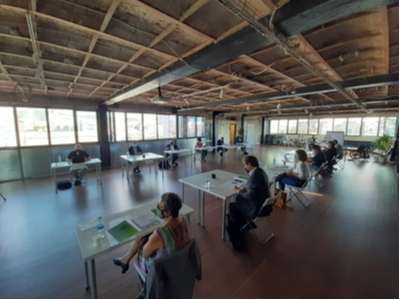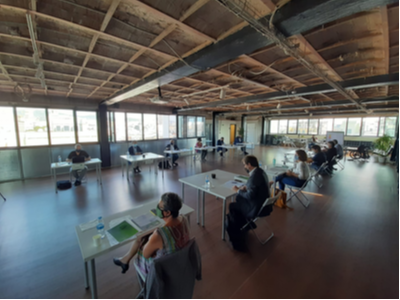- The National Pact will serve as a framework for urban renewal policy in the coming years, covering sustainability, energy efficiency, mobility linked to new technologies, and new governance instruments
- The document is expected to be published in the spring of 2021

The secretary for the Urban Agenda and Territory, Agustí Serra, and the dean of the Association of Architects of Catalonia (COAC), Assumpció Puig, today chaired a meeting of the Strategic Council of the Catalan National Pact for Urban Renewal. The first working document was approved at the meeting, and a declaration of framework principles was signed. These steps pave the way for the development of a document that is intended to serve as framework for urban renewal policy in the coming years, agreed by actors involved in building rehabilitation, construction, energy and municipal governance.
Urban areas are innovation hubs and offer many opportunities but are burdened by a legacy of social and economic inequalities and environmental imbalances. These inherited deficiencies are compounded by changes in economic models (e.g. increased mobility due to digital commerce, co-working and micromobility) and by climate change (the heat island effect, need for naturalised spaces, etc.). These challenges cannot be addressed by consuming virgin land to create a new city; the focus must be on rehabilitating, renovating and improving the existing urban fabric based on principles of sustainability and with the focus on quality of life.
Multi-sectoral approach
The rehabilitation of buildings cannot be approached from a single perspective; it must integrate a broad range of principles and approaches, including measures to increase community connectivity, new types of housing, accessibility, energy improvement, and the use of new building materials. In addition to improving quality of life for residents, the integration of all these perspectives would help reorient the construction sector, which has traditionally focused more on new construction.
According to Secretary Serra, of the 3.9m dwellings that make up Catalonia’s building stock, “70% are over 40 years old. [Therefore], conservation and rehabilitation are a necessity, and the parameters of sustainability and eco-efficiency must also be introduced”.
With the involvement of all relevant actors, the Catalan National Pact for Urban Renewal will give impetus to this process of regeneration.
Lines of action
The Catalan National Pact for Urban Renewal will be structured around four thematic blocks. The signatories to the declaration of framework principles will now start working on the following points:
Block 1: Architectural quality of urban spaces
- Urban model: definition of city model and strategies for urban renewal
- Spaces for living: housing models, functional configuration principles, mixed uses in buildings
- Culture and heritage: conservation of architectural and cultural heritage and maintaining the quality of the built environment
Block 2: Environmental strategies and the climate emergency
- Energy-efficient buildings: reducing energy demand in the existing building stock
- Renewable energies: energy transition
- Resource efficiency: circular economy and architecture
Block 3: Innovation
- New technologies: materials with low environmental impact; information and communication technologies
- Professional skills and development: developing the skills of professionals in the sector, new technological solutions, dissemination of knowledge
- Challenges for the future: sustainable tourism, shared workspaces, the sharing economy
Block 4: Governance
- Governance bodies: definition and role of the various actors involved (private sector and government agencies)
- Defining policies to drive renewal: current issues/problems with respect to rehabilitation; strategies and funding models; appropriateness of regulations; grants and subsidies; collaboration agreements
- Transparency: information and publications to disseminate actions carried out
Link to the Urban Agenda for Catalonia
The process of reflecting on how to rehabilitate Catalan cities is part of a global debate on how to promote sustainable development of urban areas and adapt them to technological transformations and climate change. In this vein, the Catalan government promoted the drafting of the Urban Agenda of Catalonia, through the Urban Assembly of Catalonia, to address these needs.


